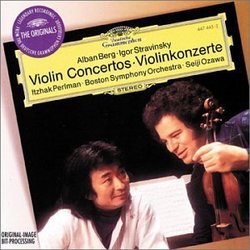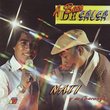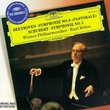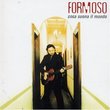| All Artists: Alban Berg, Maurice Ravel, Igor Stravinsky, Seiji Ozawa, Zubin Mehta, Boston Symphony Orchestra, New York Philharmonic Title: Berg, Stravinsky: Violin Concertos / Perlman, Ozawa Members Wishing: 1 Total Copies: 0 Label: Deutsche Grammophon Release Date: 8/13/1996 Genre: Classical Styles: Chamber Music, Forms & Genres, Concertos, Instruments, Strings Number of Discs: 1 SwapaCD Credits: 1 UPC: 028944744521 |
Search - Alban Berg, Maurice Ravel, Igor Stravinsky :: Berg, Stravinsky: Violin Concertos / Perlman, Ozawa
 | Alban Berg, Maurice Ravel, Igor Stravinsky Berg, Stravinsky: Violin Concertos / Perlman, Ozawa Genre: Classical
Berg's Violin Concerto is atonal--yes, it's the "A" word, but you shouldn't let that keep you from getting to know this modern masterpiece; it's actually very listener-friendly. The music tells a story. The first movement ... more » |
Larger Image |
CD DetailsSynopsis
Amazon.com essential recording Berg's Violin Concerto is atonal--yes, it's the "A" word, but you shouldn't let that keep you from getting to know this modern masterpiece; it's actually very listener-friendly. The music tells a story. The first movement is a character sketch of the young, flirtatious Manon Gropius, daughter of Alma Mahler and architect Walter Gropius. She died tragically of meningitis, and the second movement depicts the horrifying onset of her illness, her death, and her transfiguring apotheosis. Dedicated "to the memory of an angel," it's one of the most heartfelt and moving tributes imaginable. Stravinsky's much more abstract Violin Concerto is about being a violin concerto. Both works, modern classics, are exceptionally well played and recorded by Itzhak Perlman and Seiji Ozawa. Regarding Berg, this was a landmark recording of Perlman's both in his career as a performer and in the history of the work itself. For Perlman, generally perceived as a heart-on-sleeve traditionalist of the "old school," this venture into musical modernism confounded his detractors while at the same time introducing many new listeners to a work that, though difficult, has since come to be regarded as one of the touchstones of the Romantic concerto repertoire. Stravinsky's concerto is less controversial though no less well-played. In sum, these performances are landmarks in the Perlman discography. --David Hurwitz Similar CDs
|
CD ReviewsBland & Un-Committed Performances Jeffrey Lipscomb | Sacramento, CA United States | 05/29/2004 (2 out of 5 stars) "These are two of my favorite pieces, but the performances here are utterly bland and un-committed. Perlman merely saws through both with a mechanical, un-inflected proficiency - he often sounds like he's more in a hurry to get home. Ozawa is worse: he virtually sleepwalks his way through both scores, offering very little in the way of true collaboration. The orchestral commentary in both works just sort of wanders by, with little accentuation or inflection. In Perlman's equally bland account of the Stravinsky with Barenboim, the latter at least provided a more detailed and better executed framework than this catatonic effort by Ozawa. To my ears, no modern version of either work has matched the stunning achievement of Arthur Grumiaux, who recorded both concertos in excellent 1967 stereo sound for Philips (they were coupled on the same LP). In the Berg, Grumiaux was ably accompanied by Igor Markevitch, whereas the Stravinsky was led by Ernest Bour, a champion of modern music who was trained by Scherchen and who succeeded Hans Rosbaud at the SW German Radio. The orchestra in both cases was the Amsterdam Concertgebouw. Grumiaux was one of the last century's greatest violinists, and his combination of rhythmic zest and soaring lyricism in both works was extraordinary: he was simply a finer musician than the likes of Perlman, Stern, or Zukerman. The Grumiaux Stravinsky Concerto is available in a fine Stravinsky collection on a Philips "two-fer." Unfortunately, the Berg remains in limbo - it is urgently in need of a CD transfer. There are two old 1930's recordings that remain my interpretive benchmarks in each concerto: Louis Krasner with Anton Webern in the Berg, and Samuel Dushkin with the composer conducting in the Stravinsky. I feel that people who love these pieces should make an effort to find them and hear what is possible in this music. Despite crackly, deficient mono sonics, the Berg Concerto from May 1, 1936 on Testament Continuum SBT 1004 is an absolute marvel. Krasner premiered the work a year before in Barcelona with Scherchen conducting. Berg's friend and compatriot Anton Webern was supposed to conduct, but he got cold feet at the last moment about performing his late comrade's final testament. Just listen to the performance on this Testament CD - which Webern DID conduct, with the BBC Symphony - and you will hear what is missing with Perlman and Ozawa. It is deeply inflected and romantically impassioned: the phrasing is simply gorgeous. The 1935 Paris recording with Dushkin in the Stravinsky can now be heard in a splendid transfer on an Andante CD set. Stravinsky was closer to his roots than would later be the case: he and Dushkin fashion an earthy performance that hails back to ancient Russia itself. Dushkin is an obedient fiddler - he plays his part EXACTLY the way Stravinsky wanted it to be heard. His playing may take some getting used to: the composer insisted on an abandoned, rhapsodic, somewhat swoopy style that makes most contemporary accounts sound bland by comparison. A Columbia Records executive once told me that Stravinsky was so incensed at Isaac Stern being chosen for the stereo re-make that he threatened to break his recording contract. But he later relented, and the result was dreary in comparison with the earlier version. To conclude: try to hear Grumiaux for the best modern accounts of these magnetic scores. The earlier historic versions are wonderful reminders of truly "living" music: they are a sharp contrast to the sterile, dry-as-toast renderings we usually get these days." Why all the fuss? This is mediocre. John Grabowski | USA | 02/24/2001 (2 out of 5 stars) "I'm normally a big fan of the DG Originals series, but this is one they could have left in the vaults. The performance of the Berg is adequate. But I don't get the fuss when this has now become a competitive field. (It was not when this recording was originally released in 1980.) Throughout the work Perlman is distant and uninvolved, with a thin wirey tone that borders on ugly at times (and yes, I know this is a "dissonant" and tragic work, but the tone is simply colorless, which is different) and Ozawa conducts like he's not really listening to his fiddle player, not really relating some intricate accompaniments to what Perlman's violin line is. Time and again he skates over climaxes, holds back, fails to get all the depth from his accompanist role. The sound is not that great for a DG Originals reissue--it's rather dry. The Stravinsky fares better (though the soundstage is close-up and bizarre), but it is hardly reason to recommend the recording itself. Zukerman/Boulez, Szigeti/Mitropoulos, Krasner/Webern (the very first recording and only the second performance of the work), and above all Mutter/Levine easily beat this recording. The Mutter in particular is a hair-raising account where every shading of the score is examined and given breath and color, where the work's "Modern" and "Romantic" worlds are for once melded appropriately. (The Krasner is another example of that, largely thanks to Webern's insightful accompaniment, but with that 1936 performance there's the issue of extremely limited sound.) In short, Stravinsky, four stars...Berg one." Perlman and Ozawa make great team for these classics. Karl Henzy | 12/19/1999 (5 out of 5 stars) "You want to find out how great Perlman is? Put his recording of the Berg Concerto up against Anne-Sophie Mutter's. She's good--he's great, and in a way perhaps some aren't aware of. He's known for his "fancy fiddling," but the Berg requires subtlety, pacing, nuance--he's got it all (which is why his Beethoven Violin Concerto is so fine too). And Ozawa's orchestral backing is magical--it never asserts itself unnaturally. Both Perlman and Ozawa are clearly dedicated not to flashy display of themselves but to the music, to the composer's conception and vision, which as musicians they're looking to bring out. What happened with Ozawa in Boston? Every recording I have with him conducting is superb. Did he really become that uninspired over there, that they had to get rid of him? By the way, about the Berg Concerto--this is one the great modern masterpieces. It's form is completely organic, not following some established formal structure, but rather, ebbing and flowing like a consciousness."
|

 Track Listings (7) - Disc #1
Track Listings (7) - Disc #1


